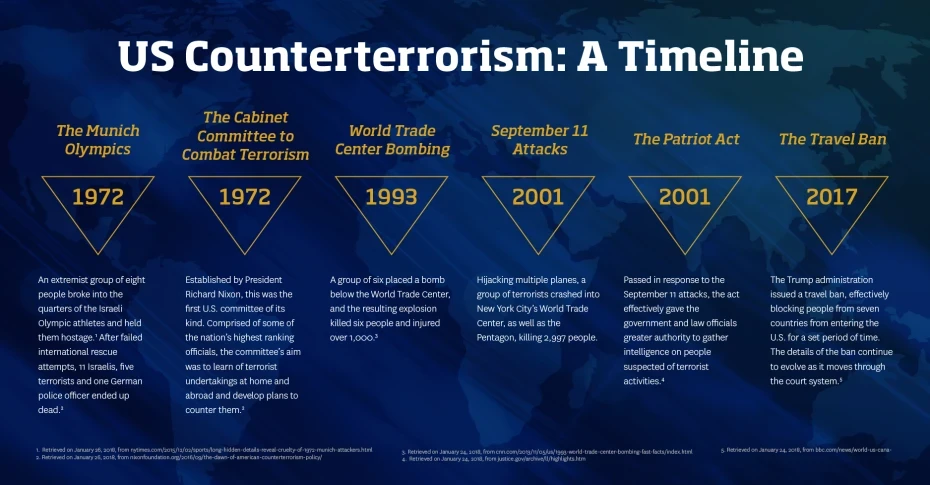Examining the Events and Laws Surrounding the Issue
“Terrorism” is a term that holds strong connotations in the United States and across the world. If the Oxford Dictionary defines terrorism as “the unlawful use of violence and intimidation, especially against civilians, in pursuit of political aims,” then we can define counter-terrorism as the lawful protection of civilians against violence and political persecution.
To better understand the United States’ counter-terrorism strategy, we’ve created a short timeline to show the events that precipitated stronger counter-terrorism laws. It also shows how U.S. counter-terrorism strategies have changed over time under different presidential administrations.
US Counterterrorism: A Timeline
The Munich Olympics, 1972
An extremist group of eight people broke into the quarters of the Israeli Olympic athletes and held them hostage.1 After failed international rescue attempts, 11 Israelis, five terrorists and one German police officer ended up dead.2
The Cabinet Committee to Combat Terrorism, 1972
Established by President Richard Nixon, this was the first U.S. committee of its kind. Comprised of some of the nation’s highest ranking officials, the committee’s aim was to learn of terrorist undertakings at home and abroad and develop plans to counter them.2
World Trade Center Bombing, 1993
A group of six placed a bomb below the World Trade Center, and the resulting explosion killed six people and injured over 1,000.3
September 11 Attacks, 2001
Hijacking multiple planes, a group of terrorists crashed into New York City’s World Trade Center, as well as the Pentagon, killing 2,997 people.
The Patriot Act, 2001
Passed in response to the September 11 attacks, the act effectively gave the government and law officials greater authority to gather intelligence on people suspected of terrorist activities.4
The Travel Ban, 2017-
The Trump administration issued a travel ban, effectively blocking people from seven countries from entering the U.S. for a set period of time. The details of the ban continue to evolve as it moves through the court system.5
Want to know more? Check out modern-day crime by the numbers and then discover the online Master of Arts in Criminology and Criminal Justice program at Kent State University.
Sources:
- Retrieved on January 26, 2018, from nytimes.com/2015/12/02/sports/long-hidden-details-reveal-cruelty-of-1972-munich-attackers.html
- Retrieved on January 26, 2018, from nixonfoundation.org/2016/09/the-dawn-of-american-counterterrorism-policy/
- Retrieved on January 24, 2018, from cnn.com/2013/11/05/us/1993-world-trade-center-bombing-fast-facts/index.html
- Retrieved on January 24, 2018, from justice.gov/archive/ll/highlights.htm
- Retrieved on January 24, 2018, from bbc.com/news/world-us-canada-39044403






